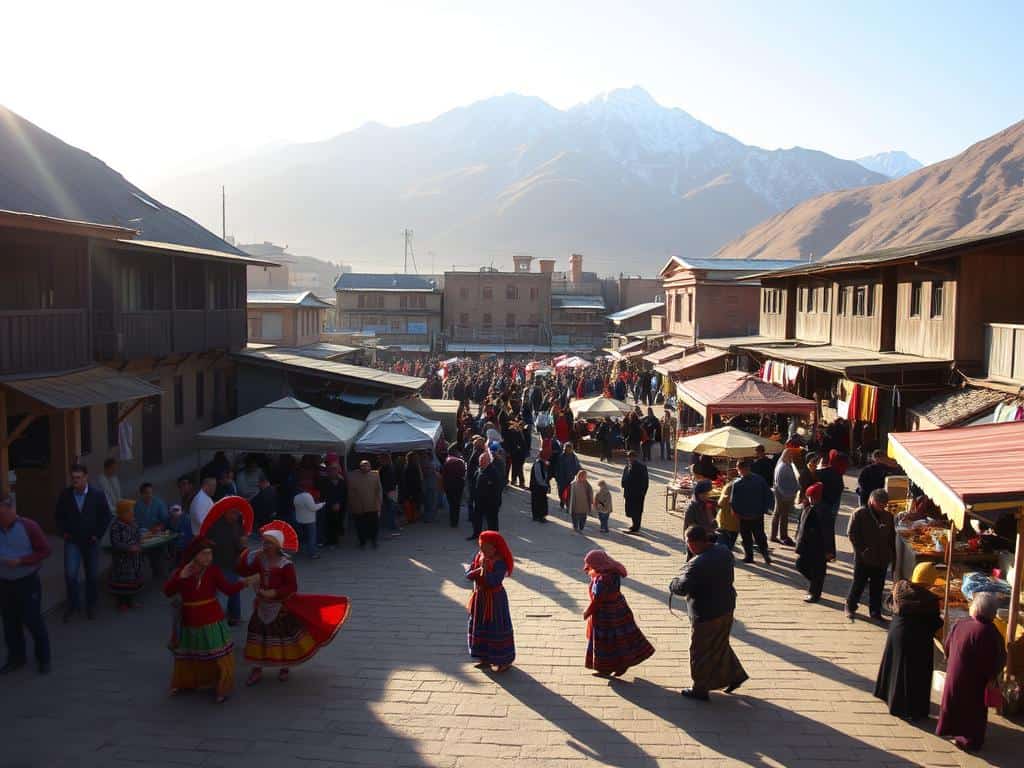I remember landing in Japan, feeling excited and a bit nervous. Walking through Tokyo’s busy streets, everything seemed new and fascinating. But watching people happily slurping noodles on the sidewalk, I realized customs vary a lot around the world. In the U.S., we eat in public with certain manners in mind. But in Japan, enjoying your meal openly is a way to honor their culture, not something to be shy about. This showed me how important it is to learn about and respect different customs around the globe.
Every trip I took exposed me to more surprising traditions, making me see how unique our world is. This article will share ten customs that might be surprising to you.
Key Takeaways
- Culture shock often arises from differences in traditional customs.
- Understanding local etiquette can enhance travel experiences.
- Public behavior and eating habits vary significantly across cultures.
- Foreign habits can challenge our perceptions of normalcy.
- Appreciating diverse traditions fosters meaningful interactions.
Understanding Culture Shock in Different Countries
Travelers often face culture shock when they explore new places. Cultural differences can show up in ways we don’t expect. They lead to feelings ranging from joy to unease.
Understanding these differences helps us get the essence of various traditions and manners. This knowledge clarifies how societies operate differently.
The Impact of Cultural Differences
Human interactions vary greatly due to cultural differences. For example, making eye contact means different things around the world. What’s seen as confident in one place could be rude in another.
These customs influence how we view foreign behaviors. Adapting to new settings makes me think about how these details affect communication and what’s expected.
Why Some Customs Might Surprise You
Encountering new customs is always an adventure. Even simple actions like greetings can be completely different.
In Japan, people bow to show respect, but in the USA, a strong handshake is preferred. These etiquette rules are key to socializing and show why it’s vital to understand foreign traditions. Learning them can make trips more rewarding and help us connect better with people from other cultures.
Traditional Customs That Leave Americans in Shock
Traveling to other countries often shows us many customs that shock Americans. These differences in behavior make me think twice about what is “normal.” I’m always amazed and interested in learning about these practices.
Going Barefoot in Public Spaces
In New Zealand, it’s normal for people to go barefoot in places like supermarkets and on buses. This surprises me, as I’m used to wearing shoes for cleanliness and safety. This custom shows people value comfort and feeling connected to the earth.
Seeing this makes me rethink what’s polite and proper in public places. It opens my eyes to how different cultures view cleanliness and personal care.
Politeness and Communication Styles
Communication styles can also lead to culture shock. For example, people in the Netherlands are straightforward, expecting direct answers. This might seem rude to Americans, who usually speak more politely.
Yet, this directness is a breath of fresh air. It shows how important it is to understand how people communicate in other countries. Every conversation is a chance to learn more about the world.

Food and Dining Customs Around the Globe
Discovering food customs while traveling instantly connects you to a culture. I’ve noticed shared family meals are very important in many places. Different countries’ dining habits teach us about connection, tradition, and respect.
The Importance of Shared Family Meals
In many cultures, family meals do more than feed us. They’re key for bonding. For example, some families make time to sit together for long meals to share their day. This is very different from the quick meals often seen in the U.S.
By valuing long meals together, these customs build stronger connections and a feeling of belonging.
Unique Eating Habits in Spain and Italy
Italy and Spain show how food customs can shape a culture’s identity. In these places, eating dinner late, around 10 PM, is normal. This late dinner time shows their relaxed lifestyle and boosts family time.
I was struck by Italy’s coffee culture, where Orzo, a barley drink, often replaces espresso. These dining habits reveal how different cultures value mealtime experiences over quick eats.
Conclusion
Traveling opens my eyes to various traditional customs, some surprise and baffle me. These customs help me handle the culture shock from exploring new places. They add depth to my journeys and teach valuable cross-cultural lessons.
I learn respect and curiosity by noticing how foreign habits are different from mine. This awareness lets me enjoy the world’s rich diversity. Embracing these customs turns challenges into chances for personal growth and deeper connections.
In short, respecting different customs while traveling makes me appreciate diverse cultures more. It makes my trips richer, turning culture shock moments into insights. These insights broaden my view and deepen my understanding of humanity.



